Week in Freethought History (May 27-June 2)
Here’s your Week in Freethought History: This is more than just a calendar of events or mini-biographies – it’s a reminder that, no matter how isolated and alone we may feel at times, we as freethinkers are neither unique nor alone in the world.
 Last Sunday, May 27, was the 78th birthday of the science fiction writer who said, “The two most common elements in the universe are hydrogen... and stupidity,” Harlan Ellison (1934). Ellison has written or edited 75 books, penned more than 1700 stories, essays, articles, and newspaper columns, two dozen teleplays (including "City on the Edge of Forever" for the original Star Trek TV series) and a dozen motion pictures. The multiple Hugo Award winner says, “Look, I'm an atheist. People say to me, do you believe in God? No, I don't believe in God. Because all the Gods that they offer me are completely as crazy ... When I look at Fundamentalists, I just want, I don't know, hit them in the kisser with a pie. But in fact they rule most of this country, which is kind of sad.”
Last Sunday, May 27, was the 78th birthday of the science fiction writer who said, “The two most common elements in the universe are hydrogen... and stupidity,” Harlan Ellison (1934). Ellison has written or edited 75 books, penned more than 1700 stories, essays, articles, and newspaper columns, two dozen teleplays (including "City on the Edge of Forever" for the original Star Trek TV series) and a dozen motion pictures. The multiple Hugo Award winner says, “Look, I'm an atheist. People say to me, do you believe in God? No, I don't believe in God. Because all the Gods that they offer me are completely as crazy ... When I look at Fundamentalists, I just want, I don't know, hit them in the kisser with a pie. But in fact they rule most of this country, which is kind of sad.”
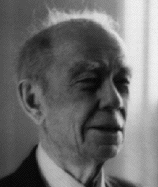 Last Monday, May 28, 110 years ago, the philosopher, author and poet Corliss Lamont was born (1902). Lamont was a humanist leader and a tireless worker for world peace and civil liberties, serving as director of the ACLU for 22 years. He wrote sixteen books and taught philosophy at Columbia, Harvard, Cornell, and the New School for Social Research. In his Philosophy of Humanism, Lamont wrote, “Supernatural entities simply do not exist. The nonreality of the supernatural means, on the human level, that men do not possess supernatural and immortal souls; and, on the level of the universe as a whole, that our cosmos does not possess a supernatural and eternal God.”
Last Monday, May 28, 110 years ago, the philosopher, author and poet Corliss Lamont was born (1902). Lamont was a humanist leader and a tireless worker for world peace and civil liberties, serving as director of the ACLU for 22 years. He wrote sixteen books and taught philosophy at Columbia, Harvard, Cornell, and the New School for Social Research. In his Philosophy of Humanism, Lamont wrote, “Supernatural entities simply do not exist. The nonreality of the supernatural means, on the human level, that men do not possess supernatural and immortal souls; and, on the level of the universe as a whole, that our cosmos does not possess a supernatural and eternal God.”
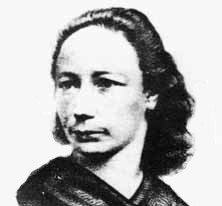 Last Tuesday, May 29, 182 years ago, the French anarchist known as “la Vièrge Rouge,” the Red Virgin, for her radicalism, Louise Michel, was born (1830). When the Franco-Prussian War ended in 1871, Louise Michel became one of the leaders of the Paris Commune. The Catholic Church had been hip-deep in Monarchist misrule, and so the Commune severed all state connection to the church, nationalized all church property, and secularized the schools. But the Commune shortly fell amid a reactionary bloodbath: Michel was arrested by the Monarchists for trying to overthrow the government. She was arrested again and again, still fighting for social justice, and better wages and working conditions for laborers until her death at age 74. Her funeral drew two thousand mourners.
Last Tuesday, May 29, 182 years ago, the French anarchist known as “la Vièrge Rouge,” the Red Virgin, for her radicalism, Louise Michel, was born (1830). When the Franco-Prussian War ended in 1871, Louise Michel became one of the leaders of the Paris Commune. The Catholic Church had been hip-deep in Monarchist misrule, and so the Commune severed all state connection to the church, nationalized all church property, and secularized the schools. But the Commune shortly fell amid a reactionary bloodbath: Michel was arrested by the Monarchists for trying to overthrow the government. She was arrested again and again, still fighting for social justice, and better wages and working conditions for laborers until her death at age 74. Her funeral drew two thousand mourners.
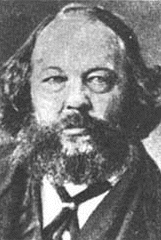 Last Wednesday, May 30, 198 years ago, the Russian anarchist Mikhail Bakunin was born (1814). After he took part in the 1848-1849 revolutions in France and Saxony, the French caught him and sent him back to Russia. He escaped from Siberia to London in 1861, where he met and worked with Aleksandr I. Herzen, the “Father of Russian Socialism.” Seven years later, Bakunin had become active in the First International, but his anarchist ideas ran afoul of those of Karl Marx, who got Bakunin expelled. Bakunin believed that mankind is basically moral and that the state is evil. He agreed with Marx when he wrote, “People go to church for the same reasons they go to a tavern: to stupefy themselves, to forget their misery, to imagine themselves, for a few minutes anyway, free and happy.”
Last Wednesday, May 30, 198 years ago, the Russian anarchist Mikhail Bakunin was born (1814). After he took part in the 1848-1849 revolutions in France and Saxony, the French caught him and sent him back to Russia. He escaped from Siberia to London in 1861, where he met and worked with Aleksandr I. Herzen, the “Father of Russian Socialism.” Seven years later, Bakunin had become active in the First International, but his anarchist ideas ran afoul of those of Karl Marx, who got Bakunin expelled. Bakunin believed that mankind is basically moral and that the state is evil. He agreed with Marx when he wrote, “People go to church for the same reasons they go to a tavern: to stupefy themselves, to forget their misery, to imagine themselves, for a few minutes anyway, free and happy.”
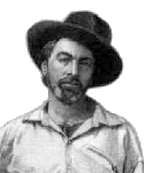 Last Thursday, May 31, 193 years ago, American poet Walt Whitman was born (1819). His father had known and admired Thomas Paine and instilled liberal ideas in Walt, which did not include allegiance to any church. Whitman had little use for conventional religion throughout his life, writing in “Song of Myself,” “Pointing to another world will never stop vice among us,” he wrote, “shedding light over this world can alone help us.” “And I say to mankind, Be not curious about God, / For I who am curious about each am not curious about God.”
Last Thursday, May 31, 193 years ago, American poet Walt Whitman was born (1819). His father had known and admired Thomas Paine and instilled liberal ideas in Walt, which did not include allegiance to any church. Whitman had little use for conventional religion throughout his life, writing in “Song of Myself,” “Pointing to another world will never stop vice among us,” he wrote, “shedding light over this world can alone help us.” “And I say to mankind, Be not curious about God, / For I who am curious about each am not curious about God.”
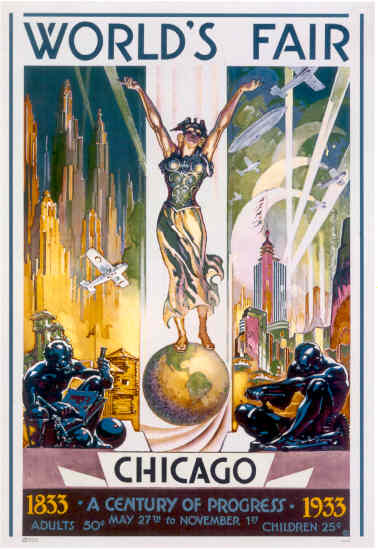 Last Wednesday, June 1, but in 1933 during the Great Depression, a World’s Fair celebrating “A Century of Progress” opened on the lakefront in Chicago, Illinois, on what is today known as Meig’s Field. You may ask, just what is progress? The very idea of progress is a novelty of the 18th century Enlightenment and the Atheists who wrote the Encyclopédie française (French Encyclopedia). If we ask which is more favorable to progress – religion or skepticism – the answer should seem obvious. But if we focus on those things about which religion professes to care – social and sexual morality, marriage and family, peace, temperance, crime, medicine, philanthropy, and (in some liberal religions) social and economic justice – the answer is far from obvious. The social aspects are easiest to dispense with: humankind has progressed in the last century with dramatic decreases in crime, including sexual crime, political corruption, death-by-childbirth, and the subjugation of women and racial and religious minorities – while vastly increasing literacy and general education, average life expectancy, disease control, sanitation, transportation, freedom of opinion and discussion, and the real wage workers. Social services and civil rights organizations unknown before the 1800s blossomed in the 1900s. And if you reach back into the century celebrated at the 1933 World’s Fair, you would have to include the abolition of slavery, the germ theory of disease, the use of anesthetics, the theory of evolution, the eight-hour day and the resurgence of unions among the progress for humanity that churches either opposed or ignored. So while everyone at the 1933 Chicago World’s Fair was celebrating a century of progress, they should also have been celebrating the foundations of that progress: freethinking and religious skepticism!
Last Wednesday, June 1, but in 1933 during the Great Depression, a World’s Fair celebrating “A Century of Progress” opened on the lakefront in Chicago, Illinois, on what is today known as Meig’s Field. You may ask, just what is progress? The very idea of progress is a novelty of the 18th century Enlightenment and the Atheists who wrote the Encyclopédie française (French Encyclopedia). If we ask which is more favorable to progress – religion or skepticism – the answer should seem obvious. But if we focus on those things about which religion professes to care – social and sexual morality, marriage and family, peace, temperance, crime, medicine, philanthropy, and (in some liberal religions) social and economic justice – the answer is far from obvious. The social aspects are easiest to dispense with: humankind has progressed in the last century with dramatic decreases in crime, including sexual crime, political corruption, death-by-childbirth, and the subjugation of women and racial and religious minorities – while vastly increasing literacy and general education, average life expectancy, disease control, sanitation, transportation, freedom of opinion and discussion, and the real wage workers. Social services and civil rights organizations unknown before the 1800s blossomed in the 1900s. And if you reach back into the century celebrated at the 1933 World’s Fair, you would have to include the abolition of slavery, the germ theory of disease, the use of anesthetics, the theory of evolution, the eight-hour day and the resurgence of unions among the progress for humanity that churches either opposed or ignored. So while everyone at the 1933 Chicago World’s Fair was celebrating a century of progress, they should also have been celebrating the foundations of that progress: freethinking and religious skepticism!
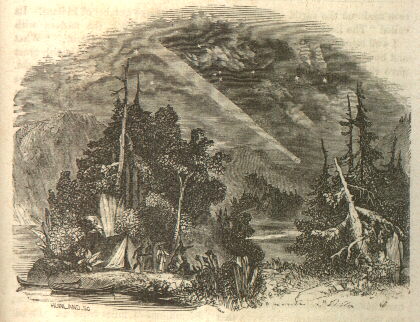 Today, June 2, 154 years ago (1858), the Italian astronomer Giovanni Battista Donati (1826-1873) observed and recorded the first appearance of the comet that bears his name today. The astronomer was 32 at the time and the Donati Comet is one of six he discovered. Throughout human history, while stars and meteors were usually seen as good signs, the appearance of a comet in the skies has been interpreted as a fireball flung by an angry God. The superstition was a burden on human progress: If a comet portended pestilence, it was God’s will and therefore useless to attempt to cure diseases. If a comet portended war, rather than wise statesmanship, princes must instead raise the sword and carry out God’s bloody will. The belief that comets presaged wars is memorialized in the Bayeux Tapestry, where a comet can be seen signaling the Norman Conquest of 1066. Donati estimated that his comet has an orbital period of more than 2000 years, so perhaps we humans, if we do not annihilate ourselves, will cast off a few more superstitions by the time Donati’s Comet returns!
Today, June 2, 154 years ago (1858), the Italian astronomer Giovanni Battista Donati (1826-1873) observed and recorded the first appearance of the comet that bears his name today. The astronomer was 32 at the time and the Donati Comet is one of six he discovered. Throughout human history, while stars and meteors were usually seen as good signs, the appearance of a comet in the skies has been interpreted as a fireball flung by an angry God. The superstition was a burden on human progress: If a comet portended pestilence, it was God’s will and therefore useless to attempt to cure diseases. If a comet portended war, rather than wise statesmanship, princes must instead raise the sword and carry out God’s bloody will. The belief that comets presaged wars is memorialized in the Bayeux Tapestry, where a comet can be seen signaling the Norman Conquest of 1066. Donati estimated that his comet has an orbital period of more than 2000 years, so perhaps we humans, if we do not annihilate ourselves, will cast off a few more superstitions by the time Donati’s Comet returns!
We can look back, but the Golden Age of Freethought is now. You can find full versions of these pages in Freethought history at the links in the excerpts above.

